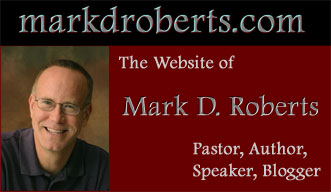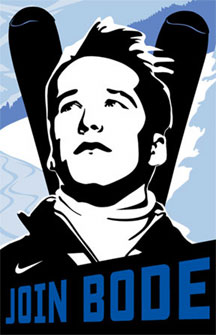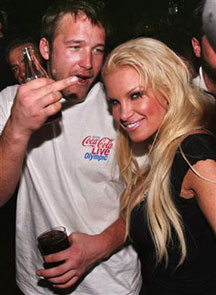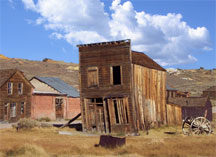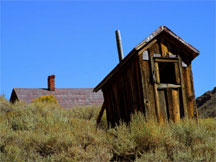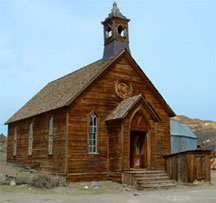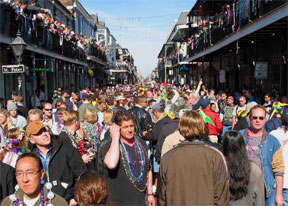| |
A Resource by Mark D. Roberts |
|
A Tale of Two Bodes
by Rev. Dr. Mark D. Roberts
Copyright © 2006 by Mark D. Roberts
Note: You may download this resource at no cost, for personal use or for use in a Christian ministry, as long as you are not publishing it for sale. All I ask is that you give credit where credit is due. For all other uses, please contact me at mark@markdroberts.com . Thank you.
The First Bode 
Posted for Sunday, February 26, 2006
A month ago Bode Miller made the cover of TIME Magzine. "American REBEL," the cover proclaimed, adding, "He speaks his mind – and apologizes later. He loves to party – and doesn't care about winning. Yet BODE MILLER is poised to strike Olympic gold. On the slopes with skiing's bad boy."
Well, TIME was partly right and partly wrong. Right about "rebel, speaks his mind, loves to party, doesn't care about winning, and bad boy." Wrong about "poised to strike Olympic gold." Very wrong. Not only was Miller not poised to strike gold. He wasn't going to strike silver or bronze either. Actually, most of his striking came when he hit gates accidentally, thereby being thrown off course and disqualified. Miller, who was supposed to be a threat in five Olympic skiing events, didn't finish three of them. His best finish was fifth in the downhill. Of course the fact that Miller was ten pounds heavier than his usual racing weight in Turin may begin to explain his lackluster performance. It surely says volumes about his preparation for the Olympics, or lack thereof, and the attitude that he brought to the Games.
If you've paid much attention to Bode Miller, you won't be entirely surprised by his performance in Turin. Though, given the fact that he was recently the finest skier in the world, and that he won two silver medals in the 2002 Olympics, you might still be disappointed in Bode. Just don't let him know it, however, if you know what's good for you. Bodie isn't interested in your expectations for him.
Bode doesn't ski to bring honor to America. He doesn't ski to fulfill anybody's expectations other than his own. And, according to Bode, he fared well in this year's Olympics. No, I'm not kidding. Bode claims to have done just fine, thank you very much.
Here's Bode on Bode:
"I just did it my way. I'm not a martyr, and I'm not a do-gooder. I just want to go out and rock. And man, I rocked here."
"The expectations were other people's. I'm comfortable with what I've accomplished, including at the Olympics. I came in here to race as hard as I could. That was my obligation to myself."
"I've been living my life as if I might have died two weeks before the Olympics started. That left me the opportunity to dig deep, to go down that other route, to make more sacrifices and get back to where I was."
"My quality of life is the priority. I wanted to have fun here, to enjoy the Olympic experience, not be holed up in a closet and not ever leave your room."
". . . it's been an awesome two weeks. I got to party and socialize at an Olympic level."
So, there you have it. Bode "rocked" in these Olympics, largely by partying at an Olympic level. Perhaps the most truthful and ironic statement of all was: "I've been living my life as if I might have died two weeks ago before the Olympics started." Yep, more dead than alive. Sounds to me like Bode's been reading Ephesians 2.
Ironically, Bode himself pretty much predicted his performance at the Turin Olympics. In a conversation with Newsweek's Devin Gordon in late 2005, Bode said:
"For me the ideal Olympics would be to go in with all that pressure, all that attention and have performances that are literally tear-jerking, that make people put their heads down because they're embarrassed at how emotional they’re getting, that make people want to try sports, talk to their kids, call their f---ing ex-wives—and come away with no medals. I think that would be epic. That would be the perfect thing."
|
|
|
Bode, the American Rebel, on the cover of TIME.
|
|
A poster from Nike's Join Bodie campaign. I'll bet you can get a good buy on a thousand of those posters today.
|
|
Bode partying with a Playboy playmate in Italy during the Olympics. Notice the shirt and the beverage. I'm sure Coke is thrilled about this free advertising.
|
Well, Bode almost got his perfect performance, though I doubt he was responsible for much tear-jerking, except perhaps from those who bet money on him. And we only put our heads down in embarrassment over how poorly Bode skied and behaved in public. But, thanks to Bode, I actually did talk to my kids more during these Olympics than I might have, because I didn't bother to spend much time watching them. I don't need to stay up late at night to watch the U.S. skiers get whupped by the Austrians.
Okay, okay, maybe I'm being too hard on Bode. After all, he's just 28-year-old kid whose excellence in skiing gave him way more attention than he could handle. Perhaps more of my disgust should be directed at those who were trying to make a buck off of Bode and therefore put him in the spotlight, companies like Nike and Time-Warner. Nike even had dedicated a portion of its website to the Join Bode campaign. It's really quite something as a creative website, with lots of advanced Flash programming. But the content is even more fascinating. Here, for example, is the Join Bode pledge:
Join the bold, the brazen, the unintimidated. Join not having excuses. Join the idea that fun is the source of all joy. Join the unwillingness to give in. Join doing things your own way. Join not joining. Join that purpose is stronger than outcome. Join your gut. Join the constant challenge of seeking greatness. Join play. Join the hunger to find what makes you happy. Join karma and nature and the effect you have on your world. Join your philosophy. Join something bigger than you. Join what you believe. Join Bode.
Wow! The ironies here are mind-boggling. Could Bode Miller become the poster child of post-modernity run wild? I wonder.
In fact, I'm thankful for Bode's performance in Turin. Had he come away with a fistful of medals, he'd have given permission to every kid in America to "Join Bode" and act like an undisciplined jerk. But now, thanks to Turin, I can indeed talk with my kids, as Bode would have me do, and tell them: "If you sow like Bode, you'll reap like Bode."
Yet I still feel sad. Sad that such an incredibly talented young man would so easily squander his gifts. Sad that Bode hasn't found more purpose in life beyond his own quest for temporary pleasures. Sad that, at least up until now, Bode has been a kind of American idol. And I'm sad that there is a part of me that relates to Bode Miller. Yes, it's true. Though I haven't been partying with Playboy playmates or preaching while hung over or flipping off reporters, in some way I can see myself in Bode. I'll explain more next time, when I talk about the second of the two Bodes.
The Second Bod(i)e 
Posted for Monday, February 27, 2006
In yesterday's post I wrote about the first of two Bodes, namely, Bode Miller, the American skier who flopped in the Turin Olympics but lived to brag about his performance as an Olympic level party animal. No lie! If you don't believe me, check yesterday's post. One of Bode's post-Olympic zingers ran this way:
"I've been living my life as if I might have died two weeks before the Olympics started. That left me the opportunity to dig deep, to go down that other route, to make more sacrifices and get back to where I was."
His comment about living as if he had already died got me thinking. It led me to a connection I hadn't made before, a connection between the two Bodes.
This connection will be much more obvious if you remember that Bode the skier pronounces his name "BOD-ee" (rhymes with the name Jody). There's another use of this name of which I am familiar. It belongs to the town of Bodie in central California only a few miles from the Nevada border. Bodie, ironically enough, was named after a man whose name was William (aka Waterman) Body, yet whose last name was pronounced "BOD-ee," just like the skier's name. Mr. Body changed the spelling to Bodey, but the town named after Mr. Body changed it to Bodie for the sake of correct pronunciation. So, there you have it, two "BOD-ees" – Bode the skier and Bodie the town.
"That's all well and good," you might be thinking, "but what's your point?" Allow me to explain why I connect Bode with Bodie.
The town of Bodie is famous, one might say infamous, in California history. In 1859 William Body discovered gold in the region. Once word got out, the town established around Mr. Body's discovery grew like gangbusters. Within 20 years the population had swelled to over 10,000 people. But what set Bodie apart from other gold rush towns was its reputation for the tawdry part of life, for drinking, sex, and general mayhem. The miners, with plenty of gold in their pockets, enjoyed life in the 65 saloons in town, not to mention the numerous brothels. There was also plenty of fighting in Bodie. Rumor has it that the town averaged one man killed a day. A minister who visited Bodie in its heyday described it as "a sea of sin, lashed by the tempest of lust and passion."
Can you begin to see a Bode/Bodie connection? Yet there's more.
By 1882, within a couple of years of its glory days, the gold began to run out, and Bodie started to decline. Before long the vast majority of Bodie's fine citizens left for greener pastures, leaving behind a struggling town in the middle of nowhere. Devastating fires in 1892 and 1932 burned most of Bodie's dilapidated buildings. By the 1940s, Bodie was a ghost town. In 1962 the State of California declared Bode a State Historical Park, preserving it as one of the largest ghost towns in America. If ever you find yourself driving north on Highway 395 in California, a side trip to Bodie is well worth a couple of hours time, though the unpaved portion of the road will shake you up a bit, so be prepared. |
|
|
The remains of a hotel in Bodie. |
|
I wouldn't recommend using this outhouse anymore. |
|
The Methodist church in Bodie is one of the best preserved buildings in town. |
Now you can see the complete Bode/Bodie connection. Both Bode and Bodie had their moment of fame. Both Bode and Bodie relished in their good fortune, enjoying their reputation as party animals. Yet, in their prime, both Bode and Bodie were on their way down, even though they didn't see it at the time. The were dying in their souls. When the gold ran out, Bodie died. Bode Miller still has plenty of gold in his bank account, though no Olympic gold to his name. Bode is already living as if he were dead. Dead man walking. Dead man skiing. Dead man partying.
Yet Bode Miller still has a chance. His life isn't gone yet. He's only 28 years old, after all. He still has unbelievable talent as a skier. And lots of money. And quite a bit of unusual charisma. At any point, by the grace of God, he could decide to invest his life in what really matters. Would somebody please buy that man a copy of The Purpose-Driven Life, for goodness' sake?! Or give him the text of the Prodigal Son. Or maybe I should send him some pictures of Bodie, California. Perhaps they'd serve in his life like the ghost of Christmas future in the empty life of Ebenezer Scrooge.
I said in my last post that I relate to Bode Miller. No, I don't behave in as obviously hedonistic a manner as Bode. On the surface my life looks pretty boring. But here's how Bode helps me take a good long look at myself.
Like Bode, I make choices each day about how I'm going to live. And, like Bode, I have the chance to do wonderful things each day. No gold medals or anything like that. Rather, my wonderful things have to do with loving my family, and my church, and most of all my God. I have the opportunity to invest my life in relationships that really matter, and in the process to make a difference for God's kingdom. In the long run, these things are more important than alpine skiing races.
Yet I can squander my opportunities for joyful, purposeful living just as readily as Bode did. And, like Bode, I can rationalize away my mistakes, thus missing the chance for life-enriching repentance. I don't hang out with Playboy playmates, but I can spend way too many hours relating to the boob tube. I don't my brain with too much alcohol, but I can fill my mind with lots of junk, not the outright sinful stuff I know enough to avoid, but the mindless, soulless junk of pop culture.
I don't want to get to the end of my days and realize that I went to the Olympics and wasted my time on parties. I want to focus on the people and the purposes that really matter.
I don't want to end up like Bodie, California, an empty, burned-out shell, a monument to deathly living. Rather, I want to nurture my inner life, my life of faith, so that even as my body wastes away, my soul will be ever more alive.
The case of Bode Miller, and especially the case of Bodie, California, turn out to have a relevance to our time of history that I didn't at first realize. I'll have more to say about this tomorrow. Stay tuned.
Will Mardi Gras Help Bring New Orleans Back to Life?
Part 3 of the series: A Tale of Two Bodes
Posted for Tuesday, February 28, 2006
Yes, I realize that this brief series has wandered all over the map, literally. I began by commenting on the behavior of Bode Miller at the Olympics in Italy. Then I rhapsodized about Bodie, California, one of the largest ghost towns in America. Now I want to connect the dots to New Orleans, Louisiana. Like I said, I'm all over the map.
But there is a connection to be made here, I believe. This occurred to me recently as I was listening to a news program on Mardi Gras in New Orleans. The show was focusing on the debate among residents of that city over the appropriateness of celebrating Mardi Gras in the aftermath of hurricane Katrina. On the one side were folks who were angry about the upcoming civic party, claiming that it was inappropriate to celebrate in this way when so many of New Orleans' residents are still homeless. According to the Mardi Gras detractors, it was a rude slap in the face for the city to engage in revelry when so many of its citizens are still suffering.
On the other side of the debate were those supporting the return of Mardi Gras to New Orleans. Some of these folks were touting the economic benefit to a city in need of money. Mardi Gras brings millions of tourist dollars, a desperately needed financial shot in the arm. But the majority of the pro-Mardi Gras advocates made, not a financial argument, but a psychological one. "New Orleans needs Mardi Gras," they said in so many words. "It will help us heal. It will reassure us that life goes on after tragedy. It's all about the psychic resurrection of New Orleans."
It's pretty easy to understand both sides of this debate, I think. If I were one of those who had lost my home to Katrina, I'd have a hard time watching folks celebrate while I and so many others were struggling to survive. Yet I also think it's important for people, indeed, for a community, to recover its beloved traditions after a tragedy. I remember what it was like to celebrate Christmas with my family a few months after my father had died. It was hard. We were filled with lots of mixed feelings. And we did some things differently that year. But there was indeed something healing about celebrating as a family, even though we all felt a big hole in our circle around the Christmas tree.
Yet I only wish, for the sake of New Orleans, that we weren't talking about Mardi Gras. I'm sure many of the local Mardi Gras traditions are harmless, with masquerades, festive foods, and lots of music. But in so many ways Mardi Gras in New Orleans is a modern Bacchanalia, a festival featuring drunkenness, indecent exposure, sexual profligacy, and other forms of behavior generally considered to be inappropriate.
To make the promised connection, I'd say that Mardi Gras in New Orleans is rather like Bodie, California in its heyday. If you missed my last post, I should explain that Bodie, now a deserted ghost town, was a thriving community of 10,000 residents in the late 19th century. When gold was plentiful, the fine citizens of Bodie spent their findings on hedonistic pleasures, principally drinking and sex. At one time there were 65 saloons in Bodie, not to mention plenty of houses of ill repute. Bodie after dark was rather like, well, New Orleans during Mardi Gras. |
|
| |
Mardi Gras celebration on Bourbon St.
in New Orleans
|
Now Bodie is deader than a doornail. But, from a theological point of view, it was dead even in its prime. It was a perfect illustration of life seen from the perspective of Ephesians 2 in the New Testament:
You were dead through the trespasses and sins in which you once lived, following the course of this world, following the ruler of the power of the air, the spirit that is now at work among those who are disobedient. All of us once lived among them in the passions of our flesh, following the desires of flesh and senses, and we were by nature children of wrath, like everyone else. (2:1-3, emphasis added)
Though the residents of Bodie thought they were enjoying life, in fact they were reveling in death, which is another way of describing life separated from God.
So here's my concern for New Orleans. Will the return of Mardi Gras help the city come back to life, or will it help the city return to death?
I have never been to Mardi Gras in New Orleans, so my perspective is limited. But I have a friend who once joined the Bourbon Street party during Carnival (the pre-Mardi Gras festival). This friend is no prude by any stretch of the imagination. Yet he said that what he witnessed made him sick, and that he would never again visit New Orleans during Mardi Gras. His personal report confirms what I hear on the news or read in the papers.
I wonder: Couldn't the leaders of New Orleans have come up with a new Mardi Gras vision, one that included plenty of civic celebrations, like parades and the like, but one that also included intentional efforts to care for the homeless residents and to rebuild the city? What would have happened if all of the revelers crowded into Bourbon Street took a four-hour break from their party in order to assist in the restoration of the Ninth Ward? What if beads were given out every time somebody made a ten dollar contribution to the New Orleans rebuilding effort?
Now I'm just thinking off the top of my head here. I expect folks in New Orleans could have come up with much better ideas than these, ones that capture the celebrative spirit of Mardi Gras and combine it with genuine acts of compassion, charity, and reconstruction. And I'll bet that many residents of New Orleans, including many of the churches, have in fact planned life-giving events for Mardi Gras. (If you hear of any of these, please e-mail me the links.)
Nevertheless, I fear that those who look to Mardi Gras to bring revival to New Orleans are looking in the wrong place. The festival might stir up lots of passion and bring in lots of money, but it reminds me all too much of Bodie in 1880.
Ironically, the roots of Mardi Gras are Christian. It was the day on which Christians people celebrated one last time before the season of Lent, which began on Ash Wednesday, the day after Mardi Gras. The name, Mardi Gras, means "Fat Tuesday," and refers to the tradition of using up whatever fats one had by eating rich foods, which were prohibited during the austere season of Lent. Ash Wednesday is a time for people to remember their mortality, their "Bodie-esque" existence, if you will. Yet the point of this remembrance is repentance, turning away from deathless life to the genuine life of God. Tomorrow I'll say more about Ash Wednesday, and how it can be a time to deepen your experience of God.
For now, my prayer for New Orleans, and for all who are there to celebrate Mardi Gras, is that in the midst of revelry, hearts will yearn for real life, and for the divine Source of that life.
Home
|



